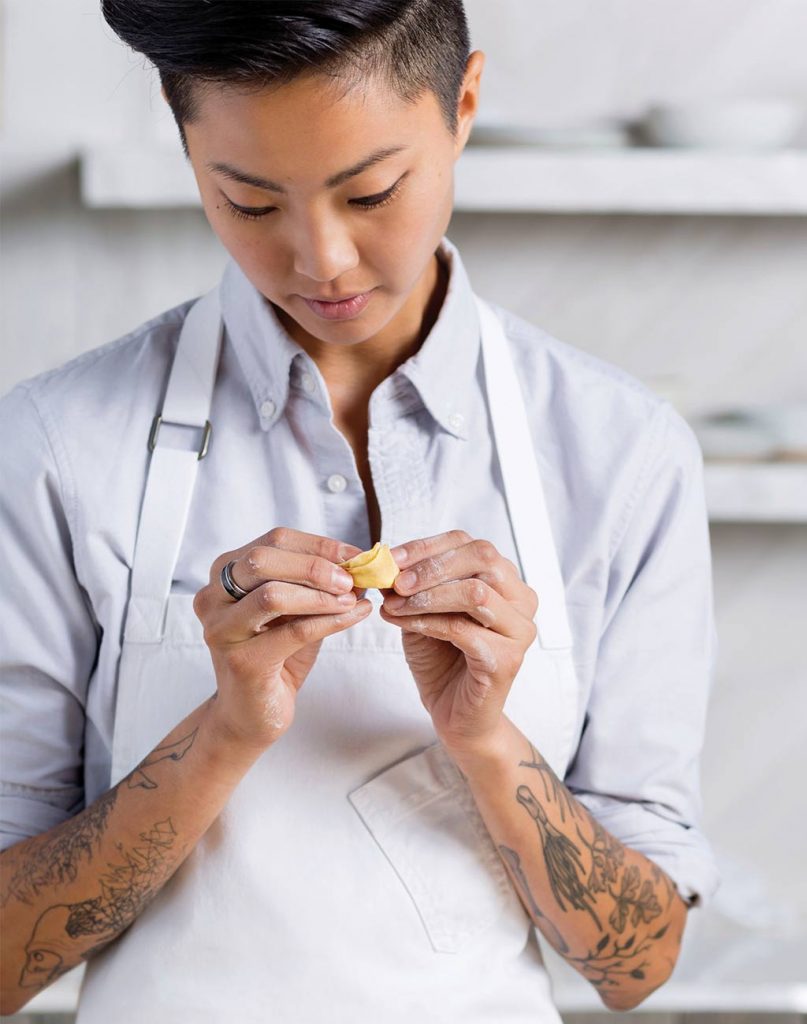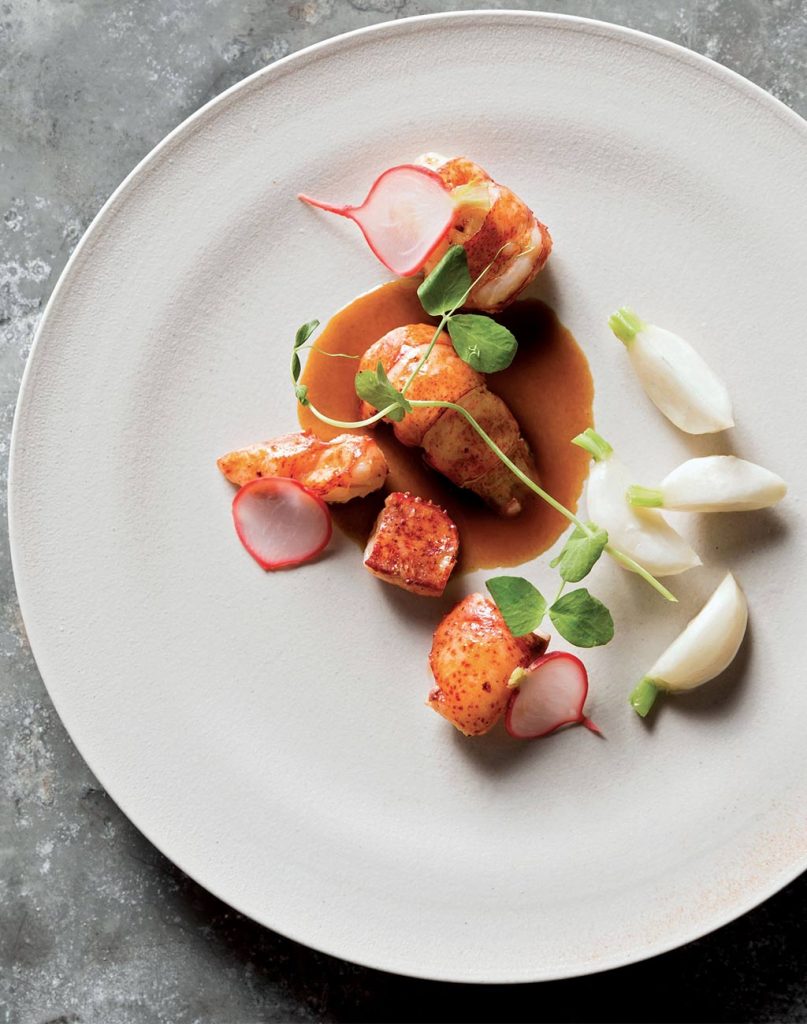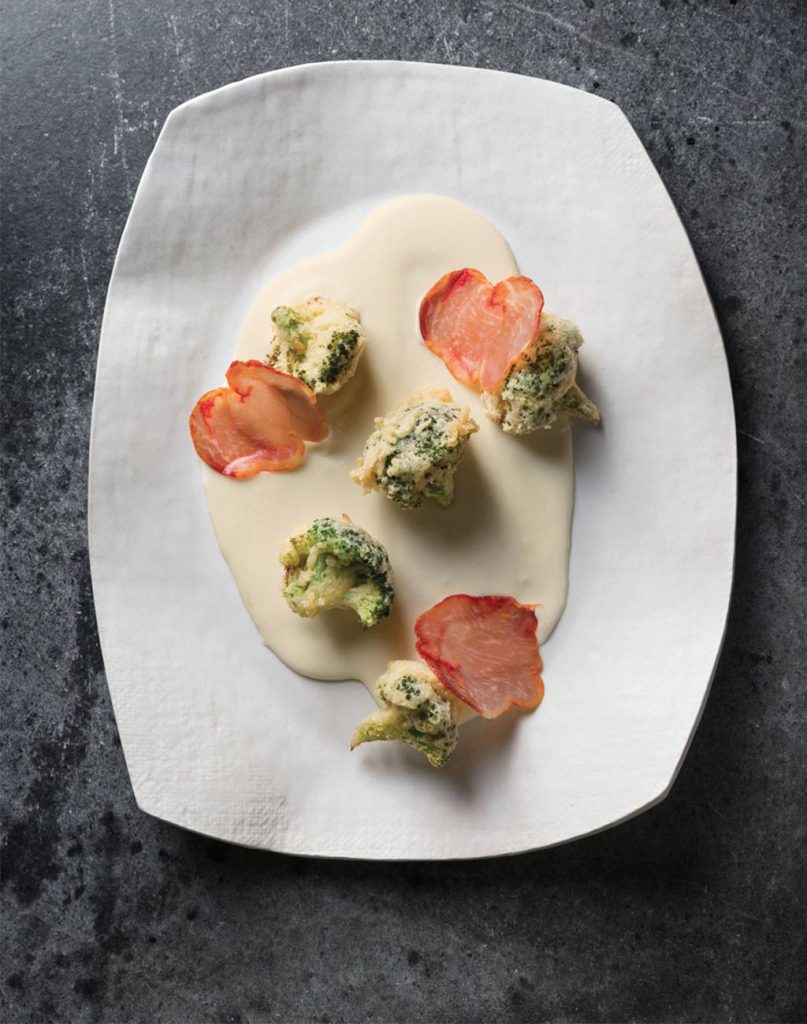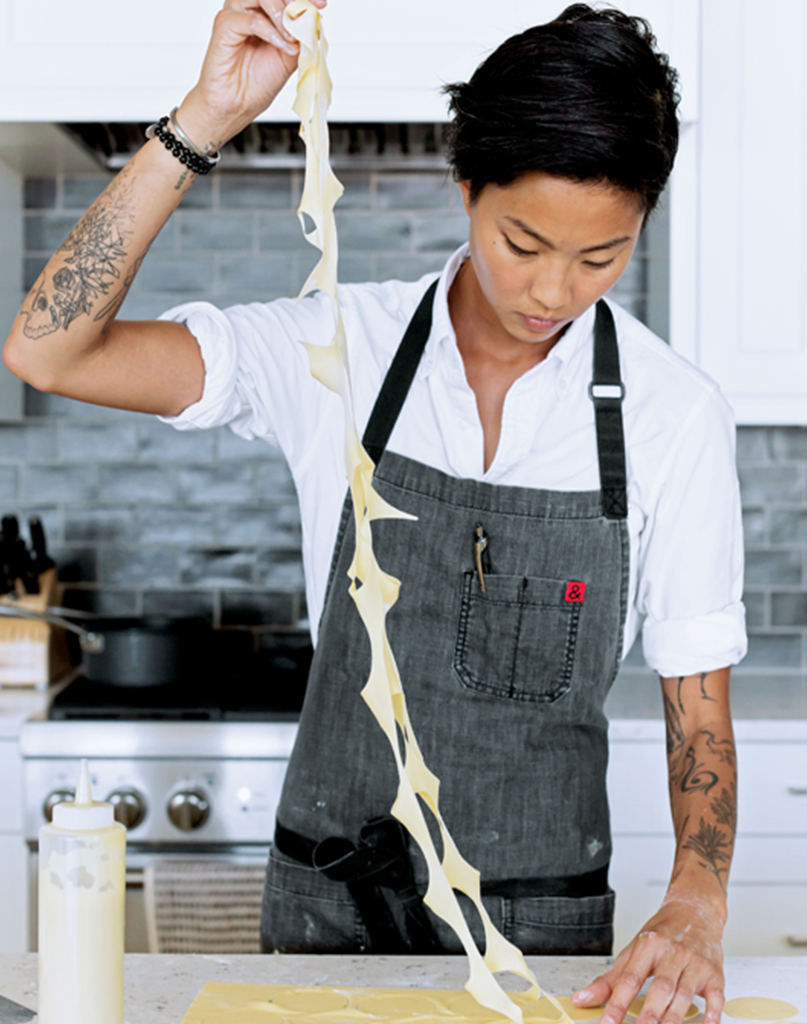
in Art
Roger Ballen
"A true artist is someone who follows the lead of their interior mind."

in Art
"A true artist is someone who follows the lead of their interior mind."

Chef Kristen Kish has a lot to bring to the table. Over the years, the former Top Chef winner and protégé of legendary chef Barbara Lynch has worked to earn her place amongst America’s upcoming culinary talent. In our interview, Kish talks about life, career and how pressure can be a gift.


When visiting Kish’s restaurant Arlo Grey, you will find a shimmering space that hums with the warm possibility of a great meal. Under Kish’s attentive eye, the modern lakeside restaurant of Austin’s Line Hotel is transformed. Inspired by memories of her childhood, the menu is an expansive experience of flavour- where broad Texan flavours mingle with accents of Korean flare. Art installations reworked from pages of Korean children’s books and Kish’s cooking notebooks adorn the walls, over the speakers, a gentle voice narrates Korean Cinderella. The experience of Arlo Grey offers tender glimpses into the intimate spaces of Kish’s life that have led her home.
Kristen Kish presents a refreshing vision for the future of professional cooking. Adopted from Korea by a Mid-Western American family at a few months of age, Kish was quickly transposed into the homely rendered towns of the Midwest. In later years, through a series of personal trials, she would publicly identify as gay. ” I struggled realizing that I was gay, but not accepting it yet,” says Kish in an earlier interview. Soldiering through the tumultuous years of her early career, Kish’s determination is emblematic of a new kitchen culture determined to challenge the dominant masculine-led status quo. With the dawn of a new era hungry for fresh voices and perspectives, Kish shares her thoughts on the quest for perfection and the extraordinary value of grit.
I struggled with owning my work and understanding that I could be good at something.
Kristen Kish


Kristen Kish: It started when I was like, five years old. I started watching cooking shows, particularly a program called ‘Great Chefs of the World’. It was on the Discovery Channel and I just kind of fell in love with it, and I started mimicking all their movements. For a long time, I didn’t know it could be a career. It wasn’t until after the first year of business university that I realised this wasn’t for me. My Mum was like, “well why don’t you try culinary school?” So I moved to Chicago from Michigan and the journey began.
KK: I went to culinary school and did a tier programme, and in school I worked in a couple restaurants, as a line cook. Then in Chicago I had a rough go at it because I was uncertain of who I was. I was trying to strive for perfection as opposed to learning the ropes in an honest way. I was always dealing with anxiety, depression and issues with self-worth, all that kind of stuff. I was an irresponsible adult and fell into bad ways; I went out too much, I fell into drugs, I drank too much, the whole thing. There was a point where I didn’t work for 4-5 months, and my Mum and Dad were like, “we’re not going to support you anymore”, so I moved back home to Michigan for about 5 months not working, and then I finally moved to Boston.
KK: I was working for Barbara Lynch in Boston, she really was my first real, true mentor. She started as my boss, then as my mentor, and she is now family and one of my dearest friends. She was the one who put me forward for the whole Top Chef thing. I was like “no way”, I struggled with owning my work and understanding that I could be good at something. Or saying it’s okay if I go and I don’t do well.
KK: The biggest question that I always get asked is, “how did it change your life?”. From the outside, you get on more TV, you get sponsors and you get people wanting to interview and know more about you. But at the end of the day, it showed me that it was okay to be myself, because I had no time to be anything other than me. I just did me and everything was okay. I didn’t know that just being me was okay. I thought I had to be this idea of perfection, or what I thought perfection was.
You have to earn your spot no matter what.
Kristen Kish
KK: I think when I was younger I definitely got treated a little differently. I was the only girl on the line. But at the end of the day, no matter the industry, you put your head down, work hard, prove yourself and then you earn the respect. You have to earn your spot no matter what.
Once I moved to Boston, I was still struggling with a lot of things personally which hindered me quite a lot in my professional career. I was just like, “I don’t give a fuck, I’m gonna put my head down. I’m gonna work”. If there were any negative things against me, it was my responsibility to ask, “what am I doing to show up? And how am I affecting their responses and reactions? Is it because I’m a woman? Is it because I’m an openly gay woman? Is it because people are jealous?”. I don’t know, I just worked.
But I think kitchen culture has already changed in a positive way. For me, I hold a very high standard and I push my cooks and there’s a level of intensity, but it’s not by degrading people. It’s by pushing them and making them challenge themselves. Do people get yelled at if they don’t do something properly? Absolutely. You know, it’s just like any other job. If you don’t do your job properly, you’re gonna get reprimanded. It’s all about the delivery of the message. You have to understand that people are people and they have to hear you in order to change. And so in order to be heard, you have to speak in a way that they hear you.

KK: There are obvious challenges. You know someone copping out, or you don’t have enough people, that kind of thing. We’ve all kind of dealt with that in some way, no matter your profession.
The biggest challenge to date has been learning how to be vulnerable. For so long we’re taught not to give in to that vulnerability; that you shouldn’t be open and honest and share who you are. That diving into yours fears is a weakness when in fact, it’s strength and bravery that we all hold. We just need to shift what that looks like. Putting on a brave face is actually weakness because you aren’t willing to go there with yourself and the people around you. That’s been the biggest struggle- just letting go, opening up and being vulnerable. In the restaurant setting, you are opening yourself up to so much criticism. Not everyone’s going to love everything and that’s one of the biggest challenges. Being okay in that space and not letting it take away from how I feel about myself and what I am doing.
I don’t ever want to feel like I ‘got it’, because once that happens, what’s the point?
Kristen Kish
KK: I think it’s ingrained in me to do the best that I can and to strive for perfection whilst completely understanding that it doesn’t exist. But it continues to drive and to push. It gives me something to work towards. People are like, “do you feel like you’ve made it?. I don’t ever want to feel like I ‘got it’, because once that happens, what’s the point? If I’ve made it and I’ve got all of it handled and under control, it means there’s nothing more to learn. I refuse to be in a place where I feel like that because if you look at the entire purpose of life, it’s to continue to grow, shift, learn – the highs and the lows, dealing with your fears, understanding your successes. They all have to work together to be a fulfilling life.
KK: It’s hard and I’m not going to lie. Some days I’m just like, “fuck, it’s a lot”. I wake up at five, I’ll be down here at six, cooking, prepping. You’ll have people fall out and then go on lunch and dinner. It’s not ever going to be perfect, because it’s just not going to be, and that’s okay. It’s about kind of taking it for what it is. And just being present and saying, “right I’m going to tackle today and do it to the best of my ability”. You just do it. The kitchen mentality is that you just get it done. Period. We do it because our guests are on the other side, and they don’t care if you’re short staffed, they don’t care if you’ve been working 15 hours already. And not by fault of being terrible human beings, but just, we are a business. Once you open the doors you have a responsibility to uphold.
And I do it for myself. But most importantly, I do it for the people that work for me and the people that I work with. And for our guests. If I know I’m not giving 100% and if I’m not doing whatever I can to troubleshoot and put out the figurative fires, then I’m doing a disservice to me,my worth and how I feel about things. So I feel the best when I work hard. It’s not always easy, but I owe it to myself to do everything I can.

KK: I think it’s been finding who I am. Once I found who I was, that infiltrated into my professional life and when that happened, you got a more honest version of a chef. Obviously Arlo Grey has been a proud moment. I mean restaurants are hard. They are hard and they are all-encompassing, all-consuming, it’s tough. But once you can tap into people, then you build a family. That’s been one of my proudest moments- building myself and challenging myself to build a family within my space of the kitchen.
My mum and dad have always been proud of me. They will always be proud of me no matter what, but I definitely struggled a lot and it came out in a detrimental way. They were supporting a non-working, non-motivated child, spending grocery money that they sent me on booze. I didn’t feel good about who I was. Looking back on it, I was a spoilt little brat. Now when my mum says she’s proud of me and my dad says he’s proud of me, it’s about me showing up for them. Now I can honestly trust when they say “I’m proud of you”, it’s because I’m me.
KK: My most memorable meals are the ones that are spent with the people who mean the most to me, meaning my family and my dearest friends. Because I live in world where I work so much, I don’t get to talk to everyone. It’s just such a rarity now to be able to sit down and share a meal and not have your brain cluttered. So those are my most memorable meals where I sit down and I empty my brain of everything other than just the people in front of me.
Kristen Kish is a Korean born American chef and winner of Bravo’s Top Chef Season 10. In 2017, she opened her first restaurant Arlo Grey in Austin, Texas, is the author of Kristen Kish Cooking and a host of Travel Channel’s ’36hours’.
Follow Kristen:
Website: www.kristenkishcooking.com
Instagram: @kristenlkish

Article from the issue :